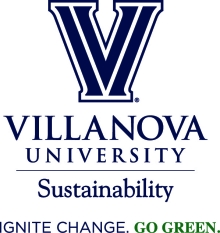Our Commitments
Climate Commitment
In 2007, Father Donohue signed the American College & University Presidents’ Climate Commitment, vowing that Villanova would achieve carbon neutrality by 2050. This program was taken over and expanded by Second Nature, and the new name is the Carbon Commitment. To achieve this, Villanova will invest in improving campus infrastructure efficiency, as well as purchase carbon offsets and renewable energy for the energy required to run campus operations.
In response to the signing of the Presidents Climate Commitment, Father Donohue established the President’s Climate Commitment Committee. In 2009, that committee was merged into the President’s Environmental Sustainability Committee (PESC) and charged with responding to all aspects of campus sustainability, not just energy. The committee was comprised of faculty, staff, and students from across campus who shared a passion for environmental issues and a desire to strengthen Villanova’s commitment to sustainability. The mission of PESC was to help coordinate, support, advance, and track sustainable practices and policies on campus and to implement the President’s Climate Commitment on behalf of the University.
In 2018, the Villanova Sustainable Leadership Council (SLC) was developed as a replacement governace body to PESC. Like the previous committee, SLC helps coordinate, support, advance, and track sustainable practices and policies on campus. The current mission of this council is to develop a comprehensive sustainability plan for Villanova University. In an effort to address all elements of sustainability need across campus, the Sustainable Leadership Council created four committees, each dedicated to a different university function. Members of the committees are made up of a mixture of faculty, staff and students from the five colleges.
Climate Action Plan
As part of the Presidents Climate Commitment, Villanova developed a Climate Action Plan (CAP) to help guide the University towards achieving climate neutrality. The plan was completed in early 2010. Click here for a summary or full copy of the CAP.
Greenhouse Gas Report
Every two years, Villanova submits a greenhouse gas report for the previous two years as part of the Presidents Climate Commitment. To view past year’s greenhouse gas reports visit the Second Nature's reporting website.
Villanova’s emissions have decreased over the past 5 years, mainly due to a switch from coal to natural gas as the main source of energy for producing steam and purchasing electricity. During this time, we have decreased our campus footprint by adding two new LEED Gold certified buildings that have added to Villanova’s overall energy demand. For more information on campus energy reduction initiatives visit the Buildings tab.
Sustainability Tracking, Assessment & Rating System (STARS)
Villanova University achieved a Silver rating under the Sustainability Tracking, Assessment and Rating System (STARS) Version 2.2. This was Villanova’s third time reporting to STARS, and the third time receiving a silver rating. STARS is a nationally recognized campus rating system for sustainability initiatives organized by the Association for the Advancement of Sustainability in Higher Education (AASHE). The rating system evaluates various aspects of campuses that range from energy and water conservation to campus diversity and pay equality. The objectives of completing the STARS rating system and gaining a certification level are to earn recognition of Villanova’s sustainability efforts and to identify a baseline for comparing with peer institutions. As a comparison, Susquehanna University also received a silver rating under STARS Version 2.2. Temple University and the University of Pennsylvania received a silver and gold rating, respectively, under STARS Version 2.1. Note, that each version of STARS contains a slightly different breakdown of available points which should be kept in mind when comparing institutions under different rating systems.
The chart below illustrates the points available through the STARS program versus the points achieved by Villanova University reflecting our most recent certification.
Since the last report, Villanova has made several notable improvements. Following the creation and implementation of Villanova’s comprehensive Campus Sustainability Plan based on the UN’s Sustainable Development Goals, we saw a big increase in points scored in the Planning and Administration section. Other notable improvements include an increase in points in the Academic section. We saw a huge increase in research producing departments that have members engaged in sustainability research from 33.33% in our last report to 70.59% in our current report. Also, Villanova’s CLAS Course Initiative Grant in Sustainability contributed to an increase in our academic section.
The biggest area for improvement is within the Operations category, which is common for most universities. The Operations category includes various subcategories, which identify areas for improvement and provide good tools for strategic sustainability planning. Each STARS certification lasts three years before institutions must resubmit under the new version. Villanova’s entire STARS report is available online.

St. Francis Pledge
In April 2014, Father Peter signed the St. Francis Pledge, committing the University to protect God's Creation and advocate on behalf of people in poverty who face the hardest impacts of global climate change.
I/We pledge to:
PRAY and reflect on the duty to care for God’s Creation and protect the poor and vulnerable.
LEARN about and educate others on the causes and moral dimensions of climate change.
ASSESS how we-as individuals and in our families, parishes and other affiliations-contribute to climate change by our own energy use, consumption, waste, etc.
ACT to change our choices and behaviors to reduce the ways we contribute to climate change.
ADVOCATE for Catholic principles and priorities in climate change discussions and decisions, especially as they impact those who are poor and vulnerable.
To learn more about the pledge and/or to sign the pledge individual visit the Catholic Climate Covenant's website.

